CHAPTER
IX: MY FAMOUS FATHER-IN-LAW
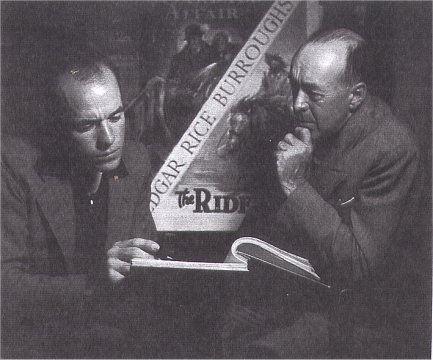
Edgar Rice Burroughs with his son ~ John Coleman ~
Jack as we called him
Jack was Phi-Bita Kappa at Pomona and one of the most
promising artists of the decade.
Edgar Rice Burroughs was kind, gentle, patient, and extremely devoted
to his family. He shunned the limelight, seemed unimpressed with his fame
and popularity, and never boasted about it at any time. He enjoyed writing,
and was happy in in his profession, which proved very profitable. He had
a struggle at first as most authors do.
He printed his name at the top of every page of his books, and he remarked
when he started, "By the time they finish reading the story, readers will
at least know who wrote it." This also helped to remind those who rejected
some of his early efforts that he was doing all right in spite of them.
He was the most versatile and knowledgeable person I ever met. What
he did not know, he made a point to research. His book, The War Chief,
depicting the pursuit and capture of Geronimo was not only researched in
great depth, but it was also based on his experiences in the U.S. Cavalry.
In one story, he placed a tiger in Africa, though there are no tigers
there. He never heard the end of that, and was always embarrassed about
it. He joked about it, but made it a point never to have such a thing happen
again.
He liked to write in longhand when he first started. His first Tarzan
story was hand-written; the manuscript is still in the family's possession.
Later he used the typewriter and, toward the end of his career, the dictaphone.
Joan was his biggest fan from her childhood. She memorized many passages
from Tarzan of the Apes and could quote them up to the end of her
life. In the radio serial we did together, she would not let anything get
by that was not just like the book and the way she knew her father wanted
it. She was a real technical director.
He wrote most of his stories at home. The following newspaper article
points out that not all of his stories sold immediately.
Los Angeles Herald-Examiner,
Wed., February 24, 1971
Bill Kennedy
MR. L.A.
"SIDELIGHTEM - First thing out of the mailing today was a prime candidate
for "The Letters I Wish I Had Never Written" department. It's a xerox of
an actual letter, written by Rand McNally & Co., Editorial Rooms, Chicago,
HI., dated Aug. 20, 1913. It was addressed to Mr. Edgar Rice Burroughs,
2008 Park Ave., Chicago, Ill.
"Dear Sir,' it read, 'We are returning under separate cover, the
All-Story magazine (Oct. 1912) containing your story, Tarzan of the Apes.'
"We have given the work careful consideration and, while
interesting, we find it does not fit in with our plans for the present
year. Thanking you for submitting the story to us, we are Yours very truly,
Rand McNally & Co."
When the children were little, they ran around the house making a lot of
noise, but it didn't bother him a bit. He worked right through it all and
when he had any time off, he spent it with his family. The children had
private tutors at the ranch. They didn't go to public schools until they
were well along in grammar school. The Burroughs family never seemed to
realize how famous he was. He was just "papa" to them - an ordinary loving
father. He never sought publicity. In fact, he never bought advertising
or hired a press agent. He shunned the spotlight and was ill at ease as
an honored guest or doing any sort of public speaking. though he was good
at it.
Although Mr. Burroughs was legend and world famous, he did have a few
peculiarities. For instance, he had terrible nightmares. He would yell
and scream almost nightly. Mrs. Burroughs jokingly remarked many times,
"I am sure Ed got most of his plots from these horrible nightmares and
dreams."
I experienced one of these outbursts. He was spending the night with
Joan and me in Sherman Oaks. Even though he chuckled at Emma's (Mrs. Burroughs)
accusations, he never once hinted that he developed a great reservoir of
ideas from these dreams.
Another quirk he had was that he always kept a Colt 45 under his pillow.
Also he carried it - with a permit to do so of course - in his car. It
was ever-present in a holster strapped to his side, when he rode over his
ranch. Again Mrs. Burroughs would kid him, saying, "Ed's afraid he will
meet up with one of the horrible monsters he writes about."
He was a major in the militia in Oak Park, Illinois, during World War
I while I was at nearby Fort Sheridan. Part of our officer's training personnel
and several companies from Fort Sheridan went down to Oak Park for a big
parade. I told Joan that the parade was where I first spotted her, waving
at the soldiers from the curb. She was only ten, and I was eighteen. I
told her I made up my mind right then that she was the one for me. It made
a good apocryphal story that she loved to repeat in later years.
Sometimes at night, after a day's writing, Mr. Burroughs would read
to his family what he had written or let them read it. They were sort of
sounding boards to see how it was going, and I guess he got a kick out
of watching their reactions. Mrs. Burroughs was very story-minded and had
a lot of opportunity to comment and criticize. It was this panel of experts
that saved Jane from death in one of the Tarzan tales. They raised such
a howl that he had to restore her.
When the children were quite young, Mr. Burroughs would walk up and
down the hall adjoining their rooms each night and tell them bedtime stories.
They could hardly wait for his cliffhangers about "Grandpa Cazmk and His
Flying Machine" or "Arrabella, the Goat. It's too bad there were no tape
recorders to capture these stories for posterity.
Joan was especially close to her father. He called her his "little RoBud"
when she was very young, and she always remember she was "Papa's little
RoBud. At one time, she had collected all the stories that he wrote. (He
gave each child autographed first editions.) He once thought he might become
a professional cartoonist, so he always illustrated his autographs with
cartoons poking fun at himself. He was a very clever cartoonist.
A few of the first editions that he autographed got away from us through
loans to friends and neighbors. We managed to replace these missing books
and Mr. Burroughs autographed them, but they were not first editions. It
was one of Joan's greatest regrets that these precious books got away from
her. The entire collection is now resting safely in a fireproof vault in
a storage company, along with memorabilia we hope someday to see in a museum
along with the collections of the Burroughs' family.
He did everything he could to help me get a foothold. He gave us a lot
to build our home in Sherman Oaks. He gave me the rights to a Tarzan story
that would have made me a star, but we became enmeshed in a long, legal
battle over rights that MGM had. Finally, they agreed to use me providing
I could pass a satisfactory screen test for talkies.
It turned out that they were putting me on. They gave me about ten pages
of Shakespeare to memorize in two days Neither Mr. Burroughs nor I knew
what they were up to. Needless to say, it was a terrible fiasco. I never
saw the test but it must have been horrible. I mumbled, stumbled, fluffed
and mutilated Shakespeare something terrible.
They said I would never make an actor, and refused to let me do this
Tarzan picture. They offered to buy my rights to the story for a large
sum and to save Mr. Burroughs embarrassment and a long legal fight at great
expense, I sold out. I think perhaps they had it in the back of their minds
all along to feed me to the MGM lion Perhaps this was what prompted him
to write me later about Hollywood, stating, "There are some damn swell
people there, but there are also more heels to the square inch than any
other place I have ever been."
When I was trying to become a flying instructor in 1941 Mr. Burroughs
wrote me. saying, "I am on good terms with Hap Arnold, top general in the
Army Air Force. I think Arnold can help you if your age is held against
you." Though I did all right by myself, I was grateful for his interest.
When the war ended and he came back to live in the Valley as a semi-invalid,
Joan visited him daily. He often said, "Joan understands me and loves me
dearly. I would rather have her near me than anyone I know."
He was a wrestling fan and TV, then in its infancy, featured lots of
wrestling. He knew how phony the matches were, but he got a big kick out
of watching Baron Leonie, Gorgeous George, and the other actors ham it
up. Watching the matches with Mr. Burroughs on TV made a fan out of Joan.
We attended many matches at the arena.
Other sports interested him somewhat, especially baseball, but I never
saw him attend any games. He also liked boxing, so the whole family often
attended amateur fights in nearby Reseda. Occasionally, we were splat-tered
with blood since the arena was small and the front row seats were practically
in the ring.
He had no religious affiliation, and none of the family ever attended
church to my knowledge. Joan was interested in Christian Science, mostly
to bolster me, but she did think it was doing a lot of people good. She
always attended church with me and was happy to have the children take
Bible study in Sunday School to round out their education. Mr. Burroughs
was an agnostic, I believe, and unlike W. C. Fields, did not turn to the
Bible toward the end of his life. A friend asked him, "What are you doing
with the Bible, Ed?" "Looking for a loophole," was his reply.
He did not believe in funerals. He requested no services and cremation.
His wishes were granted. He requested his ashes rest beneath his favorite,
very old oak tree, location of which is known only to his family.
Politically, Mr. Burroughs was a staunch Republican like his father.
He once quipped that his father said to him, "I would rather see you dead
than vote Democratic." After Joan and I were married, she registered Democratic
because I was a Democrat as were all my family. She felt that was the proper
thing for a wife to do. Family harmony at all costs. She became an F.D.R.
booster. Mr. Burroughs jokingly remarked after she registered Democratic,
"You will live to regret it."
When she could not get back into her home after she returned to the
San Fernando Valley from Nogales, due to wartime regulations and red tape,
she became furious at the Democrats and Mr. Roosevelt and immediately registered
Republican. This made her Dad, Mr. Burroughs, quite happy and gave him
a chance to say, "I told you so." I became an Independent, and still am.
There are millions of Burroughs fans throughout the world, and they
hold an annual convention to pay homage to him. Joan and I were guests
of honor at one of these sessions in Chicago. We were presented with a
beautiful silver trophy, engraved James H. Pierce and Joan Burroughs Pierce,
Guests of Honor, the Burroughs Bibliophiles, September 5, 1965. I value
it very highly.
Many fan magazines were published reviewing his writings and life. Book
sales in America and overseas, in many languages, even Braille, are greater
today than ever before. Merchandising and licensing for comic books, model
kits, and product endorsements is a great business still.
The centennial of Mr. Burroughs' birth in 1975 saw the publication of
a definitive biography by Irwin Porges, and new paperback editions of his
science fiction books, a film version of The Land That Time Forgot,
and proclamations of Edgar Rice Burroughs Day by many governors and mayors
of cities throughout the United States. For a man who once had to pawn
his wife's jewels and half sole the family shoes, and who jotted down his
first story idea on his lunch bag, this was an extraordinary tribute.
He once remarked to me, "I was a night detective in the railroad yards
of Salt Lake City and read some stories in the old dime novels. I said
to myself, "If those birds can get paid for stories like that, I'm going
to take a crack at writing, myself." He did and the rest is history.
It seems that each new generation takes to these wonderful stories and
carries on the Tarzan legend. An illustrative story concerns Supreme Court
Justice William 0. Douglas. He was deep in the jungles of Africa on a safari
when he saw a native trotting down the road. Douglas asked the guides to
find out where this fellow was going. In their native language they asked
him. He replied in Swahili, "I am going into the village to see a Tarzan
picture." (The village was miles away.) Even in Africa, Tarzan has avid
fans. This Joan and I discovered when we received many fan letters from
there when the radio program was playing in that country. We always have
answered all our fan mail and sent autographed pictures when requested.
This was a labor of love, let me tell you. We received hundreds of letters.
I still get letters from grandchildren of fans that I corresponded with
in the '30s.
The stories of Mr. Burroughs' imagination are actually coming true today
in the 1970s. His Martian, Moon, and outer planets tales are not strictly
fiction anymore. He had space ships, rockets, and all the hardware used
today in flitting all around in outer space; examples: the moon shots and
Viking I & II.
The centennial celebration of his birth, September 1, 1875, held in
Los Angeles on the week of that date, was attended by press, radio, television
and science fiction fans by the hundreds. They came from all over the world.
It seems a shame that he is not here to see what an impact he made on the
world. Tarzan, John Carter of Mars, the Princess of Mars, Carson
of Venus, The Moon Maid, and many other inhabitants of the planets seem
to be eternal. He once quipped, "If there is another life after this, I
would rather spend it on Mars than any place I can think of."
Tarzan, in the last few years, has experienced a tremendous surge of
interest. Also stories from the other worlds of Mr. Burroughs' writings.
For instance, June 9, 1976, At the Earth's Core was previewed, and
is soon to be released. The Land That Time Forgot was released in
1975, and had tremendous success at the box office, and 1977 will see the
release of its sequel, The People That Time Forgot. The space explorations
and the Martian excitement recently has awakened the public to these stories
that were written fifty or sixty years ago.
Mr. Burroughs was one of the most versatile and prolific writers ever
to appear on the world scene. He wrote over a hundred stories. Tarzan was
the best known of his characters, but his Martian, Venus, Inner earth,
Indian, Western, Mystery, and other subjects were very popular.
Ray Bradbury, a very great science fiction writer in his own right,
said that Burroughs set the stage and influenced many youths to become
space scientists. Had it not been for Edgar Rice Burroughs, we would never
have had a man on the moon or the Martian and other outer-space programs.
In spite of all Mr. Burroughs' tremendous success, his private life
headed into rough seas. Just at the time when he should be relaxing and
enjoying what all that had gone before had made possible, a situation in
1933 climaxed something that had been brewing for many years in the relationship
between Mr. and Mrs. Burroughs.
All through the years from the time the Burroughs family settled permanently
in the San Fernando Valley, Emma had developed a drinking problem. They
had a beautiful home and a lot of friends, and entertained lavishly the
high society people of Los Angeles, and especially the Hollywood stars
and executives. Tarzan pictures were becoming very successful and popular.
Huge parties were the vogue and Mr. and Mrs. Burroughs were invited to
many of them. As Tarzan's fame spread, so did Mr. Burroughs' popularity.
He became personal friends with most of the big named stars and producers.
Consequently, many huge parties were given at the Burroughs' ranch to
reciprocate for the many invitations they were constantly accepting. Gradually
Emma became unable to handle the drinking and developed an uncontrollable
problem. After a party, she would continue to drink for days which was
causing Mr. Burroughs embarrassment and led to many unpleasant scenes before
the children and servants.
Occasionally, Emma would lay off drinking for days and sometimes, weeks.
During these periods, she was again a wonderful wife and mother. However,
these compulsive sprees would overtake her and she would be off again.
Joan was a little girl of twelve or so years during this period. Because
of the drinking, Emma had not learned to drive. The family chauffeur took
her everywhere. Mr. Burroughs gave strict orders for Joan to accompany
her mother and the chauffeur on all shopping trips or whatever. The children
had a private teacher that held school in a room over the ballroom, built
for that purpose, so she was always available for the trips. She made up
her classwork as was necessary. Joan was told by her father not to let
Emma out of her sight, no matter where she went.
Emma would often get started drinking during a hair-dressing session
or with the sales person in a department store that she always dealt with.
During fitting sessions and hairdressing operations, Emma would be out
of Joan's sight. Joan would wait in the outer rooms and when Emma came
out, she would be unable to navigate without help from Joan. Sometimes
Joan would have to go to the parking lot to get assistance from the chauffeur.
One of these saleswomen of a big fashionable department store would
plan parties for customers in a hotel where she lived and have Emma as
a guest, who would also foot the tab. Joan would stay with her Mama on
these occasions as she was told to do, but she could not stop her from
drinking. Joan suffered humiliation and trauma from these sessions. She
would break into hysterics at times, and yell and scream at these hustlers
and freeloaders until they would break up the party. Emma sometimes passed
out cold and Joan would have to get the bellboy to bring the chauffeur
to her aid.
All of this caused Mr. Burroughs great anguish when Emma was carried
into the home. Then, of course, when Emma sobered up, after a day or so,
she and Mr. Burroughs quarreled hot and heavy. This situation went on until
1926 when Mr. Burroughs met Florence Dearholt, a close friend of Joan's,
even though she was much older than Joan. He was a pushover at this period
for a change of pace from the Emma problem and began playing patty-cake
with Florence. It became evident soon that Florence was using Joan as an
opportunity to get close to Mr. Burroughs. Joan was blind to the plan on
Florence's part, and therefore, was unsuspecting. Since Florence posed
as her best friend, Joan could not imagine that she was being used - but
good.
Florence also promoted her husband, Ashton Dearholt, into a position
of producer and general manager of a company he talked Mr. Burroughs into
letting him organize. It was called Burroughs-Tarzan Enterprises.
They set up offices under this name, and launched their first enterprise,
a Tarzan picture with Herman Brix, an Olympic champion shot putter with
a beautiful build. He later changed his name to Bruce Bennett. The company
went to Guatemala on location and had a hell of a time finishing the picture.
It took weeks and weeks over the schedule. They wound up with a colossal
turkey and lost their shirts. To this day, no one knows where all the money
went. It certainly did not show up in the picture. This was Mr. Burroughs'
last effort as a "sugar daddy" for the Burroughs Tarzan Enterprises.
Joan and Florence were still friendly as Joan had not yet caught on.
Florence was still on the scene constantly. Joan, Florence, and Ed decided
to take a trip to visit me on location in Flagstaff, Arizona. It was during
the filming of The Life of
Jesse James. Fred Thompson produced it and played Jesse James - I
played Frank James, Jesse's brother.
After they arrived, it did not take me long to read the picture. I saw
immediately what was cooking; however, I kept my trap shut, thinking it
was just a hot flash on Ed's part and that it would soon flicker out.
But alas, the romance exploded and Mr. Burroughs set about arranging
for a divorce from Emma. Florence also had to make the move to get unhitched
from Ashton.
Joan was a total wreck when she learned what had happened. She tried
desperately to talk her dad out of the crazy idea - a June and January
situation that was bound to come to no good end. He said to Joan, "I love
her and have a right to all the happiness she can bring me." Joan replied,
"Florence has two children that will live with you. They are only kids.
Lee Ashton is only six and Caryl is only three. How can you go through
bringing up another set of children at your age?"
"My mind is made up," he replied, "Nothing can stop me now."
"All I can say is that you will wish you had never seen Florence before
you have to leave. It can't possibly work," was her final remark with tear-filled
eyes.
Joan stuck close by her mother and never set eyes on Florence again.
She refused the wedding invitation and many pleas from her father to visit
them and try to understand.
Florence and Ed lived in Hollywood for a long time after the wedding
but decided to move to Honolulu, perhaps to get away from old haunts and
memories. Joan cut out a picture from the Los Angeles newspaper, showing
Mr. and Mrs. Edgar Rice Burroughs, formerly Mrs. Ashton Dearholt, aboard
ship just before sailing for Honolulu. Below it, she inscribed, "They look
like a couple of convicts." I still have the clipping.
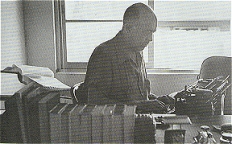 After
a year or so in Honolulu, the marriage began to hit the rocks. The two
children he had acquired by the marriage got on his nerves, and Florence
gradually became estranged. The whole impossible arrangement had run its
course. They became bitter and irritated each other unbearably.
After
a year or so in Honolulu, the marriage began to hit the rocks. The two
children he had acquired by the marriage got on his nerves, and Florence
gradually became estranged. The whole impossible arrangement had run its
course. They became bitter and irritated each other unbearably.
On March 14, 1941, Florence and the two children sailed for Los Angeles
without Ed. A divorce was arranged and a settlement was made. Florence
was to get $1,000 per month until she remarried, plus costs and lawyer
fees. This was a pretty good settlement as far as Ed was concerned compared
to today's prices for severing ties. In a year or so, Florence remarried,
and Ed was off the hook.
Mr. Burroughs came home for a while after it was all settled, but was
not comfortable here and returned to Honolulu to live by himself. In a
few months, his health began to fail, and Hulbert went to Honolulu to live
with him until he recovered.
Joan was never estranged from her father and they corresponded regularly.
He never held it against Joan for not accepting Florence. Jack and Hulbert
visited them occasionally. He still loved Joan dearly and wrote many beautiful
letters to her after he returned to Honolulu. That was his custom all through
his life - to write regularly to Joan. I have letters left by Joan that
she had saved that went all the way back to her child-hood. There are over
two hundred of them.
Mr. Burroughs and Hulbert were in Honolulu when the Japanese struck
Pearl Harbor. The following letters reveal their experiences through the
attack:
Letter dated to Joan relating to the attack, dated Honolulu, December
9, 1941:
Honolulu, December 9, 1941
To Whomever Gives a Damn:
Alternate expanded feature at ERBzine 1023:
http://www.erbzine.com/mag10/1023.html
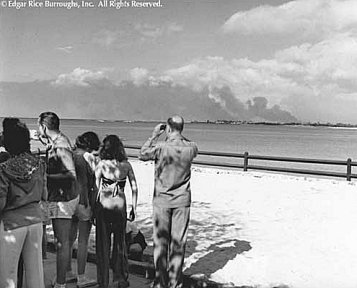
As our experiences during and immediately after the Jap blitz may interest
several of our friends and relatives, I'll record what I recall, send the
ms to Tarzana with a request to Mildred to mimeograph several copies and
mail them around. This will save me the trouble of writing the whole thing
over a number of times. With the principal facts you are all acquainted,
so I'll just set down our personal experiences and reactions, together
with some of the wild rumors which circulated. You will be fully as capable
as I to judge of the truth of such rumors.
When we awoke Sunday morning, December 7th, we heard a great deal of
firing, some of it very loud; but we hear a great deal of firing here and
had been informed by the newspapers the day before that heavy guns would
be fired from various parts of the island during the ensuing several days;
so we thought nothing of it and went to breakfast.
After breakfast we dressed for tennis and went out to the court which
is on a point that projects out into the lagoon, giving an unobstructed
view of the coast from Diamond Head in one direction far beyond Pearl Harbor
to Barbers Point, with the Waianae Mountain Range looming up in the background.
There is an area of sand for sun bathers beyond the ocean end of the
tennis court, and soon a great many of the hotel guests were congregated
there watching the show. Bombs were falling on Pearl Harbor. We could hear
the detonations and see the bursts quite plainly. Anti-aircraft shells
were bursting, fighting ships at sea were firing. We could see them plainly.
Bombs were falling in the ocean not far from us. One nearly hit a large
freighter or supply ship lying off coast perhaps a mile or so from us.
It got out of there in a hurry. Black smoke was billowing up from Pearl
Harbor. One among us, brighter than the others, said that it was a practice
smoke screen. It was either an oil tank or a tanker or our burning fighting
ships. We don't know yet. For several hours we alternated tennis while
watching the show they were putting on before we learned definitely that
it was the real McCoy. Even the truth did not interfere with our tennis,
and I should like to say right here that all the people were calm and unafraid.
There were several Navy women whose husbands were probably in it somewhere.
Mrs. A's husband is attached to an old light cruiser then lying in the
harbor. She knew that he was down there where all the bombing was going
on. Cecile's husband commands a submarine which was at Manila the last
she heard. Both these girls carried on quite normally, though Mrs. A. told
me the next day that she had eaten scarcely anything since the beginning
of the attack.
Cecile plays tennis with Hulbert and me every day, and she played with
us all during the battle. There are many army and navy wives here, but
there was no sign of hysteria. Every report that we have had concerning
the civilians on the islands has been the same. There has been no panic,
but a great deal of cooperation with the military on the part of civilians,
a very small percentage of whom are 100 white. But white, black, brown,
or yellow, they have all been splendid.
Bombs fell in the city not far from us. Smoke was rising from several
fires. Ambulance, police, and fire sirens were screaming almost continuously.
Anti-aircraft shells were bursting all over the place. I think that many
of our civilian casualties, and there were a great many of them, were caused
by our own fire. But of course that cannot be helped.
There seems to be more praise than bitterness expressed for the Japs.
As one of the navy wives expressed it: "They caught us with our pants down."
If anyone tells you that they can't shoot straight, you can give him the
laugh. They flew in over Pearl Harbor at about fifty feet and sunk three
cruisers with aerial torpedoes. They bombed hell out of Hickam Field, Wheeler
Field, Bellows Field, and the brand new navy flying field at Kaneohe Bay.
They flew low over Rogers Airport (civilian) and machine gunned the place.
I am told that we lost two hundred planes that never had a chance to get
off the ground. Our fliers were not there! We take the weekends off from
war. It was a long time before we saw one of our planes in the air. The
navy also takes weekends off and most of our ships were undermanned. The
Japs had been well informed as to the best day and hour to strike. The
attack was brilliantly conceived and executed. It smelled of German efficiency.
We understand that six enemy planes were shot down. Something like fifty-four
came over in the first wave. A navy man told me that every gun on every
ship in Pearl Harbor was firing at one lone Jap who was flying low while
bombing, and every shot missed him. One soldier is credited with bringing
down one Jap with an automatic rifle. The Jap was flying low straight toward
him, machine gunning as he came. The soldier said that he was scared stiff,
but he kept firing and had the thrill of seeing the Jap crash just beyond
him.
During all of this, we continued to play tennis at the hotel. There
was nothing else that we could do as orders were constantly being broadcast
to civilians to keep off the streets, to stay home, and not to use the
telephone; also to remain calm.
I think our tennis is worthy of a few remarks. It is paddle tennis.
We play it on a court that is not even quite a singles court, but we play
both doubles and singles on it. The hotel had to remove some palm trees
to build it, but they did not remove enough. There are several practically
in the court. According to our ground rules if a serve bounces into a palm
tree it is considered a net shot and may be taken over. Very often we have
run around a palm tree to return a shot. The end aprons are very short
and there are not aprons on the sides, just a drop of a couple of inches
to the ground among the palm trees. When an angling shot comes over, we
have to look down first to see where we are stepping before we can get
into position to return it. It is all very exciting. I can't understand
why there are not a lot of sprained ankles. Close on one side of the court
is the lagoon, which is also close to the ocean end of the court. When
a ball goes into the ocean, someone has to wade in and get it - usually
Hulbert. We play with regular tennis balls instead of the sponge rubber
paddle tennis balls, so the game is rather fast for a too small court;
but we get exercise and have a lot of fun dodging palm trees.
Shortly after lunch Sunday a radio call came in for all able-bodied
men at the hotel to report to Pier 2; so Hulbert, a Mr. Rost, and I drove
down in my car. They didn't want us at Pier 2 and told us to try the wharf
at Kewalo Basin. This is where the Japanese fishing sampans are tied up.
There, they took our names and told us to report back at 4:30. We had signed
up for guard duty.
We came back at 4:30 and signed up again in another company. Nothing
happened; so we found someone else with shoulder bars and signed up again
in his company. We were now definitely signed up. There was much confusion.
No one seemed to know anything. Sand bag machine gun emplacements had been
erected pointing both inland and toward the beach. We never knew from which
direction the enemy was supposed to come. Parachute troops were reported
off Barbers Point about five miles. There was still anti-aircraft fire,
if I recall correctly. Dense smoke was arising from Pearl Harbor.
We were finally ordered to the Honolulu Tuna Packers Ltd. warehouse
on the wharf, where Springfield rifles and ten rounds of ammunition were
issued to each of us. Hulbert, Rost, and I were in Patrol 2, Company A,
1st Battalion. We stuck together - The Three Musketeers. We were then told
that we would be on sentry duty from 10 p.m. until 2 a.m.
Just after dark we were sent over to the Kewalo Inn, a night spot, where
we were given soup, sandwiches, and coffee. A few dim lights were burning
in the back room where we ate. Volunteer girls waited on the tables, or
rather cleared them. We waited on ourselves. One of the girls who came
to our table is a photographer for Beers, whose studio is next to our office.
She photographs patrons of the Kewalo Inn. But there was no photographing
nor floor show Sunday night.
Later (after lunch): From a "usually reliable source" we learned this
noon that three enemy submarines entered Pearl Harbor Sunday morning and
torpedoed our ships. All three were sunk. Our informant said that he asked
the officer who told him this how three enemy submarines could get into
Pearl Harbor. The reply was that they gave the correct signal. Another
report is that we have sunk eighteen Japanese fighting ships, that we have
lost two carriers and the Japs one.
Back to Sunday: After we had eaten, Hulbert and I were detailed to guard
twenty-two enemy aliens in a wire enclosure on the wharf. Hulbert was at
the back end; I was at the front where the gate was. There was no lock
on the gate. I also had to challenge everybody who passed my post entering
the wharf and examine their passes. Inasmuch as I had no flashlight, my
identification of passers-by was sketchy. The entire U.S. Army Engineering
Department passed several times. My chief duty seemed to be to make the
prisoners and others throw away lighted cigarettes and step on them.
Rost was posted at the door of the packing company's engine room with
orders to let no one enter. Rost is a short, fat, middle-aged man. I believe
he is a well-known dog fancier and kennel show judge. He said that the
first thing that happened was a Filipino who dropped down from the ceiling
scaring Rost out of seven years' growth. Rost corralled him and called
the sergeant of the guard. Then some men came and tried to get into the
engine room. Rost wouldn't let them although they said they worked there.
He said he had orders to let no one in, not even a general. So an officer
came and tried to get in. Rost kept him out. Finally the officer of the
guard, a regular, came and relieved Rost - he was too good.
I was told that the FBI would send a truck for my prisoners. A police
car came for them and I wouldn't let them have them until an officer came
and O.K.'d it. We had our orders, by God, and we were going to obey them;
and as we were able to convince everyone. We guarded the prisoners for
over an hour, and then I thought we'd get some rest; but no. Every time
our company commander saw me, he had something for me to do that required
walking - and I hate walking. And then, at 10 p.m., we, Hulbert and I,
were given a post a long block long on Ward Avenue, the street that runs
into the Fisherman's Wharf from inland. It was very dark, as the whole
city was blacked out and it was raining much of the time. We had to stop
and question every pedestrian and the driver of every car. I halted the
United States Army in jeeps and trucks a dozen times or more and several
police cars. I reminded myself of a funny little Shriner I once saw directing
traffic in Las Vegas, Nevada, at midnight. Was he taking it big!
December 12th
Hulbert and I are now attached to G-I at Iolani Palace. We are chauffeurs,
because we each have a car. I have mine, and we borrowed one from Cecile
Bumside for Hulbert. Mrs. Bumside is the girl with two little tots, whose
husband commands a sub at Manila. She hasn't heard a word from him and
does not expect to for God knows when.
I work from 8 a.m. to 4 p.m. Dinner at hotel is 4:30 on account of Blackout
- then Blackout; so I have no opportunity to write much. Damn the Blackout!
It is, for most of us, the worst part of this war. Damn Hitler! Damn the
Japs! Damn everybody! ! !
I'll send along what I have written, and maybe some day I can add to
it.
In closing, this I want to repeat that the spirit of the people here
is marvelous. Regardless of what you may hear, there is practically no
sabotage here - absolutely none that I have heard of from official sources.
White, black, brown, yellow - everyone is working willingly and with a
broad grin. There has never been any panic, and what fear there is is well
camouflaged. We are more afraid of the little boys with Springfields than
we are of the Japs.
Aloha! Ed.
To Whomever Gives a Damn
(continued)
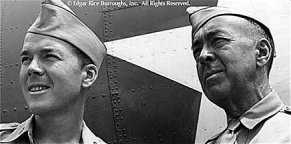
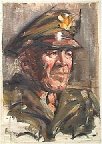 December 7th
December 7th
Hulbert and I walked post in the dark and the rain from 10:00 p.m.
to 2:00 a.m. on the 8th, Hulbert making one arrest of a pedestrian without
a pass. As I had no flashlight and couldn't have read the passes if I had
had, I made no arrests. Furthermore, I had been given orders to let no
one approach to within less than fifteen feet of me. At this absurd distance,
I was supposed to read passes in the dark; so I let everybody pass, knowing
they would be halted innumerable times before they reached Fisherman's
Wharf. All night one could hear "Halt!" "Halt!" popping all over the landscape.
It must have been some time after midnight that someone shouted for
one of us to come to the guard tent. Hulbert, thinking that this might
mean relief from walking post, generously insisted that I answer the summons.
I did. And I was detailed as one of the guards to march some twenty or
thirty enemy aliens to the Immigration Station for internment. By this
time, both shoulders were sore from packing my Springfield and my feet
had practically ceased to exist as such, being merely two pains. The Immigration
Station is a long way from Kewalo Basin. Before we got there, the seat
of my pants was dragging on the pavement. We marched our prisoners into
a large warehouse. Fortunately for the preservation of the Union and the
safety of Democracy, there was a cot just inside the doorway. I immediately
sat on it, mentally announcing that I would remain there indefinitely rather
than walk back to Kewalo Basin. Shortly after, a good Samaritan said that
he would take us back in the truck. What was left of my legs and feet gave
one last, spasmodic reaction to, by this time, a slightly corroded iron
will, and landed me on the tail board of a truck. I may never go to heaven,
the chances are that I shall not; but at that moment I experienced all
the spiritual exaltation and beatific happiness that those who are to enter
the Pearly Gates are led to expect. Instead of upon a cloud, I sat upon
the equally moist rear end of a truck; in place of a harp, I carried a
Springfield; and for a halo, I wore a soggy felt hat from Oviatt's.
Arriving at Kewalo Basin, I resumed walking post.
During our tour of duty (I am a trifle hazy as to the chronology of
events) there appeared to be a second attack on Pearl Harbor. There were
loud explosions, bursts of anti-aircraft shells, and the sky above the
Harbor was illuminated by red anti-aircraft tracer bullets, describing
graceful curves, crossing and recrossing until lost in the clouds. It was
a magnificent and awe-inspiring spectacle. A civilian guard machine-gun
detachment on the roof of Felix's Cafe on Fisherman's Wharf blasted away
in the general direction of Pearl Harbor ten miles away. They had a gun
that had not been assembled previously for fifteen years and their mouths
were constantly watering to try it out. During the night they also fired
over our heads at rocks showing above the surface of the water out in the
lagoon. They almost looked like boats carrying landing parties.
This same detachment was not without resourcefulness. They had rigged
up a tarpaulin-covered cubbyhole about the size of a pup tent close to
their gun, into which they could crawl to have a smoke; and their commanding
officer had invited me to take advantage of it; so Hulbert, Rost, and I
went up.
This Felix, upon whose roof the machine was was mounted, is the same
restaurateur who operated the ill-fated Felix's Castle on Sunset Boulevard
about three years ago. When he found that I had once been a patron of his
Hollywood folly, he gave me breakfast and introduced me to his staff. He
has a less pretentious but more profitable place here, specializing in
sea foods. He is a very nice person.
After being relieved from sentry duty sometime after 2:00 a.m., Hulbert,
Rost, and I managed to elude our commanding officer and seek repose. We
tried to find it in the shipping room of the Honolulu Tuna Packers, Ltd.
So was the repose. We lay down on a cement floor that had no soft spots.
The air was filled with the aroma of departed tuna, cigarette smoke, sweat,
and a part of the 27th Infantry that had been on duty for several weeks
without benefit of baths.
Hulbert, the louse, slept. Rost draped himself on a table top. I lay
down for a while, and then had so much difficulty getting up again that
I determined to ossify in a sitting position.
At the first streak of dawn we went out into the open again, where people
commenced ordering us around once more. Presently there was another alarm,
and we were ordered to take cover. Everyone lay or squatted behind sandbags,
lumber, or what have you. With guns pointing in all directions, no one
knew from what direction the enemy was supposed to be coming. I say everyone,
but there was one exception. I did no squatting nor no lying, even when
Hulbert tried to drag me down. I was not animated by any excess of courage
but by a definite conviction that if I once got down, I should never be
able to get up again. Portions of my anatomy that ordinarily bend fairly
well seemed to be on the verge of bending no longer.
About eight o'clock, having gotten the war off to a good start, we went
home.
The next morning, we went to work for Civilian Defense at Iolani Palace
as messengers and chauffeurs.
Hulbert thinks it remarkable that he and I should have done sentry duty
together; but when the next war comes along in twenty years or so, I'll
probably be walking with Mike, my only grandson.
1/8/42. (Edgar Rice Burroughs)
Soon after Pearl Harbor, Hulbert joined the Air Force, and Ed was appointed
a War Correspondent for United Press at the age of sixty-seven, the oldest
accredited correspondent in the Pacific Theatre. Hulbert went on to become
a Major and attained a splendid record in the photographic section of the
Air Force. He had many thrilling experiences photographing under fire all
over the South Pacific. Ed traveled all over the Battle Zone by plane and
battleship, reporting his experiences. He made it a habit to interview
GI's and send the interviews to their home town papers so their parents
would be able to read about where they were and what they were doing. He
met many of the high-ranking officers and was always given the VIP treatment.
He also had many hair-raising experiences under battle conditions. He was
on a ship that was attacked by a Kamikaze. He was rather old for the rigorous
action, climbing ship's ladders, jumping into landing boats, and living
the stress and strain of battle. He held up on sheer guts because he felt
it was his way to do his part in the war effort.
The following is a letter he wrote to Mike about his experiences after
he returned to Honolulu:
LETTER TO MIKE
Also featured in 1944 Wartime Letters of ERB
http://www.erbzine.com/mag10/1026.html
Honolulu
April 28, 1944
Dear Mike:
Was glad to learn that you had joined the den at Sherman Oaks. It is
good training for boys; and will be helpful to you all through your life,
besides being fun while you are a member.
I know just how you felt about sleeping in your own bed again. For the
past five weeks I have been sleeping on Army cots, usually without a pad
or a pillow. And for all that time I never had hot water for washing or
shaving. Those things are not hardships - they are just discomforts. They
are good for a fellow once in a while.
Coming back from Tarawa, I was on a big four-engine transport plane
bringing back some casualties. There was one extra litter, so I flew home
horizontal, which was far more comfortable than the gosh-awful tin bucket
seats. I was at the bottom of a tier of four litters, with just barely
room enough to squeeze out occasionally and roll on the floor in a most
undignified manner before I could stand up.
I flew about 7,000 miles this time - in C-47s, C-54s, and B-24s. The
B-24s were most uncomfortable, as the wind blew up around the ball turret
and out the tail-gunner's back window. And it was darned cold at nine and
ten thousand feet. I always stand up in B-24s to keep from freezing to
death. Just that little moving around keeps my blood from congealing. But
I'm sure tired by the time we come in.
One phase of flying a B-24 always scares me stiff. Those in the waist
have to go forward when the plane is taking off. The only place for me
to go was the cat-walk through the bomb-bay. It is about eight inches wide,
and the space between the bombs is so narrow that I have to slither through
sideways. It is also dark and cramped and no place to look out except a
tiny crack at the forward end of the bomb-bay doors. And noisy! Gosh! And
rough, too, as the plane gets up speed. You know they run about a mile
during the take-off. And there is the knowledge that in a crackup, everyone
in the bomb-bay is always killed. I used to watch that crack in the bottom
of the front end of the bomb-bay, and I didn't breathe easily until I saw
green water and knew that we were airborne. I can think of lots of pleasanter
places to travel than in a bomb-bay.
As a matter of fact, Mike, I hate flying. I have flown about 15,000
miles since the war began, all over water. I am never air-sick, nor do
high altitudes affect me unpleasantly; but I still hate flying. If I ever
get back where they have trains, I'll take the Super Chief every time.
Give my love to "Mom" and Joanne, and accept a lot for yourself.
Grandpa Ed.
Mr. Burroughs corresponded regularly with Mike. He has all the letters
and is very proud of them and his famous grandfather. Although as a youngster
he did not stand in awe of Mr. Burroughs, he was just Grandpa Ed to him.
The following is a letter depicting Mr. Burroughs' interest in his grandchildren;
not only Mike, but all five of them. Mr. Burroughs was extremely patriotic,
as the following poem plainly demonstrates:
Is There a War?
"Is there a war that's worth the toll of blood and pain
Of buoyant youth that may not laugh or love again?
Is there a war that ever can
Be wholly justified by man?
What can the glory of the chieftains mean to one
Who, mute and frozen, lies beneath his useless gun?
Or to the wife or mother wondering why such thing
Can be, or what of good it possibly can bring?
Is there a war which man can sanely contemplate
That's worth the tears and agony, the grief and hate?
Yes, such a war can surely be
If it but set or keep man free.
At the end of the war, he was seventy and was invalided at home with a
heart condition. The old Tarzana Ranch was sold and became a golf course
and country club. Only the Burroughs' office on Ventura Boulevard still
remains. His three children had homes and families of their own in neighboring
communities.
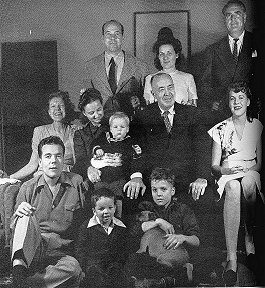 He
found a suitable home in Encino, on the last street next to Tarzana, Zelza
Avenue. His backyard bordered on the Tarzana city line. Here Mr. Burroughs
published three more books and lived out his remaining years as a semi-invalid
with a Japanese couple taking care of him. He was reading the Sunday comics
in bed right after breakfast when he died. His marvelous sense of humor
ever present to the very end. He simply nodded and fell asleep.
He
found a suitable home in Encino, on the last street next to Tarzana, Zelza
Avenue. His backyard bordered on the Tarzana city line. Here Mr. Burroughs
published three more books and lived out his remaining years as a semi-invalid
with a Japanese couple taking care of him. He was reading the Sunday comics
in bed right after breakfast when he died. His marvelous sense of humor
ever present to the very end. He simply nodded and fell asleep.
His passing was not only a sad blow to his children, relatives, and
friends, but it sent a shock-wave through-out the world that saddened his
millions of fans. The event had tremendous press, radio, and television
coverage. His Tarzana headquarters and his children received hundreds of
letters and cards of sympathy.
On his last visit to our home after he returned from Honolulu, he remarked
in my presence, "Joan darling, you were so right when you told me I was
making a mistake in marrying Florence. I have often regretted that I did
not heed your advice."


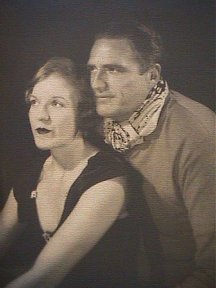
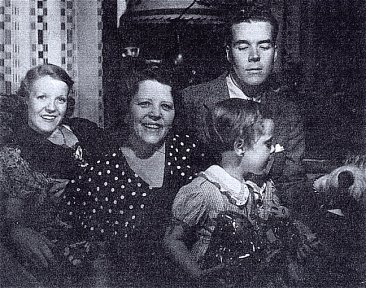
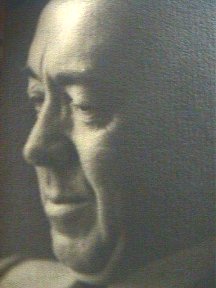
![]()
![]()
![]()
![]()

![]()